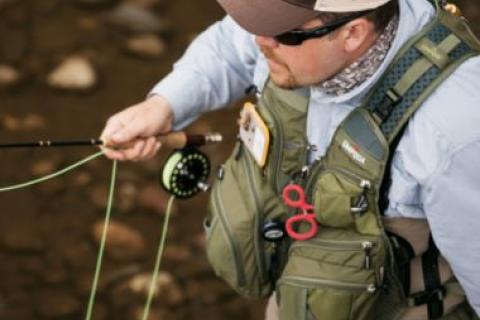
Fly boxes, tippets, fly floatant, split shots, strike indicators, knot-tying tools, clippers, forceps – the list of fly-fishing accessories is extensive, and carrying those accessories on the water is exhausting and nearly impossible without a good pack or vest. The key to finding one you’re comfortable with is knowing how much equipment you need to carry. The smaller the pack or vest, the easier it is to fish with it on. Some anglers prefer to be minimalists and for them, tiny, light packs are ideal. Others prefer to have every piece of equipment along with every single fly they have any time they are fishing. Most fall somewhere in the middle. You need to figure out what you prefer in order to pick out the right product.
Fly vests are the traditional way to organize and carry your tools, and they are still very popular and convenient. Fly vests have front and back pockets to store accessories and flies. Most fly vests have a lot of pockets and a lot of room, so if you’re an angler who needs several fly boxes and all the accessories, a vest should work well for you. Even though fishing equipment isn’t all that heavy, choosing a pack that reduces the amount of weight on your neck and shoulders and spreads the weight evenly over your body makes a day of fishing more comfortable. Both mesh and nonmesh materials are available. A mesh vest is very useful on hot days when its extra breathability keeps you cool. However, it is easier to tear mesh vests.
Chest packs are essentially a backward backpack. Because the pack is on your chest, your accessories are always your fingertips. Some chest packs have integrated backpacks for more storage. They also keep you cooler than vests.
Lumbar packs are quickly rising in popularity for several reasons. All of the weight from a lumbar pack is placed on the strongest parts of your body: your hips and legs. They are very light and store all of your gear in front of you, much like the chest pack, so accessing it is easy.
There are a ton of options out there for fishing packs, and they all have different benefits and downfalls. By using the information above along with vendor information about specific packs and your own knowledge about what you need, you will be able to purchase a pack that will serve your fishing needs.
- 2971 views

